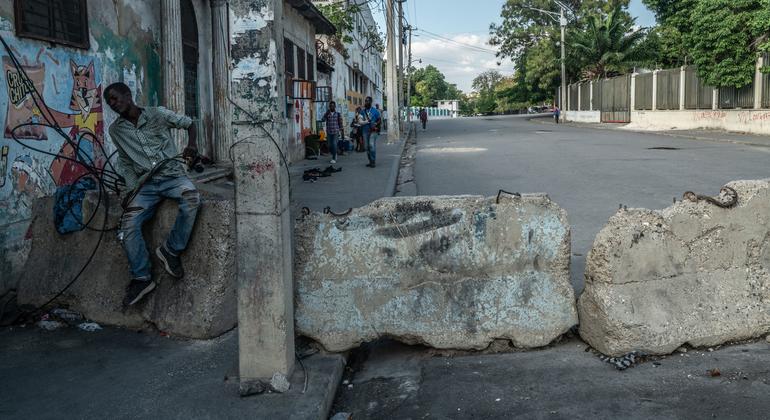Haiti: The desire to live again amid the pain of displacement

The number of displaced people in the Caribbean nation has reached record levels, with nearly 600,000 people forced to leave their homes this year – double last year’s figure. This makes Haiti the country with the highest number of displaced people due to violence.
Support from NGO TOYA
Louise and Chantal* both received support from the Haitian NGO TOYA, a partner of the Pan American Health Organization (PAHO), the regional arm of the World Health Organization (WHO).

People continue to flee their homes in Port-au-Prince because of gang-related violence.
Louise, 47, is a single mother of five. Only her 11-year-old child lives with her, while the other four are scattered across the country. “We were chased out by bandits; they burned down our house,” she said in testimony collected by a PAHO official.
Her mother recently passed away from high blood pressure and stress from constant moving. “My mother had to move twice in a short period of time,” she lamented.
‘I took a big step back in my life’
Chantal, 56, a single mother of six children, shares Louise’s suffering. Her house was also burned. “The robbers raped me and my daughter. As a result, I became infected with HIV. They beat me and I lost four teeth. My children’s father is no longer able to take care of them. Now I’m broke. I took a big step back in my life and didn’t know how to recover,” she explained.

A funeral procession passes through the Great Cemetery in downtown Port-au-Prince.
“Insecurity took everything from me; I was half crazy and half sane. I even thought about drinking bleach to commit suicide after the incident,” she testified.
Louise stayed in another relocation site before arriving at Carl Brouard Square in Port-au-Prince. During this time, the TOYA Foundation helped her by providing kits with essential items and money to allow her to start a small business.
However, this respite did not last long. One day, “bandits” invaded the location at Carl Brouard Square, and once again, she lost everything. “My business, my belongings, I couldn’t take anything with me during the attack,” she said.
Insecurity took everything from me; I was half crazy and half sane. I even thought about drinking bleach to commit suicide after the incident.
— Chantal
Chantal went to the TOYA Foundation facility, where she received psychosocial support, training courses and funding.
‘Life is not over’
“During the training sessions, TOYA psychologists taught me what life is and its importance. They showed me that life is not over for me, that I can become what I want to be and that I am still valuable. I received significant support from everyone at TOYA,” she emphasized.
She now lives with a relative and several children. Some of her children are in the provinces, including her teenage daughter who was also raped with her.
“Thank God she is not infected with HIV. But she has been hurt ever since. She doesn’t want to return to Port-au-Prince. She was supposed to graduate this year but had to stop everything because of this incident,” Chantal recounted.
She said she faced a lot of discrimination from her family because of her HIV-positive status. “They thought I might infect them because I lived under the same roof,” she said, noting that she continued to take her medication without any problems.
Despite this difficult situation, she still focuses on life and how to earn money to send back to her children who are scattered in many places.

Women in Port-au-Prince visit a mobile clinic supported by UNFPA.
‘I want to see my children grow up’
For her part, Louise currently has no support because she has lost her only source of income, her business.
“All I want is to live in peace,” she said. “Life in the locations is really difficult. The classrooms where we sleep get flooded every time it rains. We have to wait for the rain to stop before we can clean up and find a small space to rest and try to sleep.”
It’s been a long time since Louise had the opportunity to visit some of the children she sent to the province. “I couldn’t go there because of the cost of living and the robbers extorting money from passengers on the way,” she explained. “I’m tired of running away under gunfire. We are always at risk of being attacked at any time.”
In this difficult context, Louise’s biggest goal “is to live”.
“All I want is to live,” Chantal repeated. She still suffers from high blood pressure “because the tension in Haiti is really unbearable.”
“But I still have to continue my business because I have many mouths to feed. I want to “see my children grow up; I want to see them succeed in life,” she said.
*Character names have been changed to protect identities.


